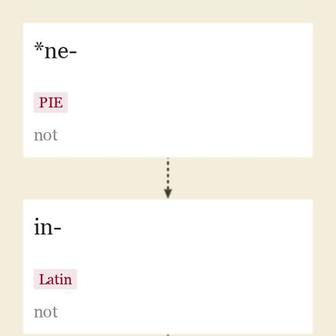innominable (adj.)
"不可名状的," 14世纪晚期源自法语 innominable,来自晚期拉丁语 innominabilis,意为“无法命名的”,来自于 in- "不,相反" (见 in-(1))+ *nominabilis,来自于拉丁语 nominalis,意为“与名称有关的”,来自于 nomen(格形式 nominis)意为“名称” (源自 PIE 词根 *no-men- "名字")。在玩笑中, innominables = "裤子"(1827; 见 inexpressible)。
innominable 的相关词汇

这个词缀的意思是“不,相反,没有”(也可以是通过与后面的辅音音节化的 -n- 的同化而来的 im-, il-, ir-,这种趋势始于后期拉丁语),源自拉丁语 in- “不”,与希腊语 an-,古英语 un- 同源,均来自 PIE 词根 *ne- “不”。
在古法语和中古英语中,通常使用 en-,但大多数这些形式在现代英语中已经不再使用,只有极少数(例如 enemy)不再被视为否定的。在英语中的经验法则是,对于明显的拉丁语元素使用 in-,对于本土或本土化的元素使用 un-。
1620年代,来自 in-(1)“不”+ expressible(见 express(v.))。Inexpressibles “裤子”出自1790年。相关: Inexpressibly。
I have retain'd the word BREECHES, as they are known by no other name amongst country folk.--The change from vulgarity to refinement, in cities and towns, has introduced other appellations; there they are generally called SMALL CLOTHES, but some ladies of high rank and extreme delicacy call them INEXPRESSIBLES. [footnote in "Poems Miscellaneous and Humorous," by Edward Nairne, Canterbury, 1791]
我保留了“BREECHES”这个词,因为在乡村人中没有其他名称。——从粗俗到精致的转变,在城市和城镇中引入了其他称呼; 在那里,它们通常被称为 SMALL CLOTHES,但一些高贵而极其细致的女士称它们为 INEXPRESSIBLES。[脚注在“Poems Miscellaneous and Humorous”中,作者为 Edward Nairne,坎特伯雷,1791年]
Inexpressibles 是最早记录的,因此似乎引发了这一趋势: Unmentionables(1806); indispensibles(1820); ineffables(1823); unutterables(1826); innominables(1827); 以及 inexplicables(1829)。
“名称” Proto-Indo-European 词根。
它成为了以下单词或词根的全部或部分: acronym; allonym; ananym; anonymous; antonomasia; antonym; binomial; caconym; cognomen; denominate; eponym; eponymous; heteronym; homonym; homonymous; hyponymy; ignominious; ignominy; innominable; Jerome; matronymic; metonymy; metronymic; misnomer; moniker; name; nomenclature; nominal; nominate; noun; onomastic; onomatopoeia; paronomasia; paronym; patronym; patronymic; praenomen; pronoun; pseudonym; renown; synonym; synonymy; synonymous; toponym。
这是一种假想的词源/存在的证据源自于以下语言:梵语 nama; 阿维斯塔语 nama; 希腊语 onoma, onyma; 拉丁语 nomen; 古教堂斯拉夫语 ime, 属格 imene; 俄语 imya; 古爱尔兰语 ainm; 古威尔士语 anu “名称”; 古英语 nama, noma,古高地德语 namo,古斯堪的纳维亚语 nafn,哥特语 namo “名称”